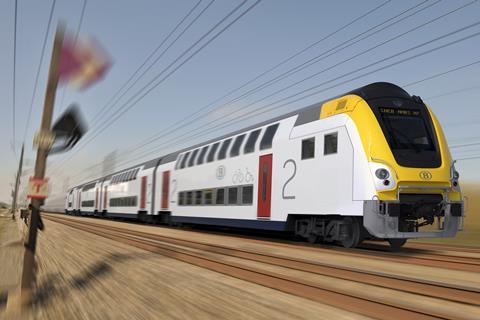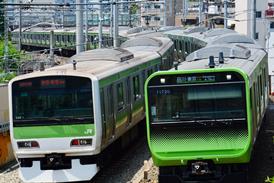
BELGIUM: National operator SNCB has ordered a further 204 Type M7 double-deck coaches, placing a contract for multifunctional vehicles adapted to improve accessibility for passengers with reduced mobility.
Awarded to a consortium of Bombardier Transportation and Alstom, the €445m contract announced on December 21 has been placed within a December 2015 framework agreement covering up to 1 362 coaches, which included an initial €1·3bn firm order for an 445 vehicles.
The latest order ‘clearly reflects the strong confidence that SNCB shows in our double-deck trains and the comfort they offer’, said Sébastien Ridremont, Head of Sales for Bombardier Transportation in Benelux.
Deliveries of the initial batch had been scheduled to take place between September 2018 and 2021, but it was not until January 2020 that the first cars were ready for test running, and the coronavirus pandemic led to further delays. Delivery is now underway, with around 40 cars expected to be in service by the end of the year.
The M7 is derived from the earlier M6 double-deckers, but has been designed to offer flexibility in operation. The vehicles can be used as either electric multiple-units or with locomotives in push-pull sets combining both M6 and M7 coaches. Designed for a maximum speed of 200 km/h, they can operate on the entire Belgian network, as well as on cross-border routes to the Netherlands and Luxembourg, including some high speed lines.
Accessibility
The initial M7 order included multifunctional cars for passengers with reduced mobility. However, the height difference between the doors and existing platforms meant that some passengers needed assistance with boarding and alighting.
In September 2020 SNCB adopted a new accessibility policy intended to enable passengers with reduced mobility to travel independently. This specified that all platforms should be 760 mm high, and new rolling stock would be required to match.
The vehicles in the latest order will be designed to this standard, incorporating sliding access ramps. There will also be additional space for wheelchair users, an adapted toilet and an intercom system.
‘The new cars will be accessible to people with reduced mobility and passengers in wheelchairs, as well as being more easily accessible for the elderly, people with children or travellers with bicycles’, explained Ridremont. ‘SNCB wants all passengers to be able to take the train completely autonomously in a comfortable and safe manner’.
- On December 13 SNCB opened Anderlecht station on Brussels suburban route S3. It is the 35th station in the Brussels Capital Region, and the 144th on the suburban network. Construction was funded by SNCB (€2·2m) and infrastructure manager Infrabel (€1·5m) as part of the four-tracking of the Denderleeuw – Bruxelles-Midi line.

















